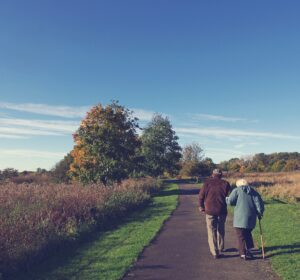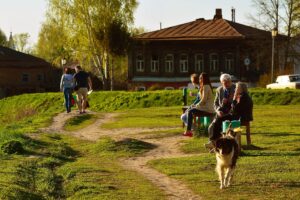This article was written within the framework of the Interreg Europe SILVER SMEs project. It reflects the author’s views only and the Interreg Europe programme authorities are not liable for any use that may be made of the information contained therein.
Europe’s rural areas are ageing faster than urban areas. The ageing of the population brings challenges in terms of quality of life in regions that are often suffering from remoteness, lack of services or fragmented mobility or care services.

Older adults in rural Europe
Rural areas are ageing rapidly. This demographic trend is naturally linked to the overall ageing of Europe, but in rural areas it is combined with depopulation and youth out-migration.
Demographic projections expect that the highest increase of the share of older adults will be experienced in rural areas in the future, with an increase from 19% in 2011 to 30% in 2050 compared to 15% to 27% in cities. Some countries, like Poland, Slovenia, Austria, and Spain, will see their population over 65 in mountain areas increase by more than 60% by 2050.
Yet many rural areas are not well prepared for this demographic change. In many areas, the services available are becoming increasingly scarce, whether in terms of health care, mobility, postal services or simply local shops. Moreover, they are often not adapted to older people either from the point of view of accessibility, as in the case of transport, or of the content of the offer, like in the case of active leisure activities or care offers.
An untapped silver market
One of the emerging and promising sectors to face this challenge is the Silver Economy, which covers all goods and services developed for the older population. The Silver Economy includes a wider range of sectors, from housing to leisure, food, mobility, and home services. Depending on the governance of each Welfare State, the Silver Economy can also be linked to health and care.
Given the ageing of the population in rural areas, the Silver Economy therefore offers clear opportunities for these territories. However, the term and what it encompasses remain relatively unknown to rural economic actors and regional and local policy makers. A 2022 study conducted among businesses in Ireland, Spain, Portugal, France, Slovenia, Poland and Sweden, for example, revealed that only 35% of those interviewed were familiar with the term Silver Economy.
The study also shows that companies are not very aware of the opportunities offered by this new sector and that little training was provided to these economic actors to help them better take into account the specific needs of the ageing population.

How can the Silver Economy improve the quality of life of older rural people?
The Silver Economy was at the heart of the SILVER SMEs project carried out in 8 ageing rural and mountain regions. Based on their demographic projections, these territories aimed to develop the Silver Economy as a solution to some of the challenges posed by ageing.

The actions carried out by these 8 rural regions responded to the gaps identified in the 2018 study. Firstly, they have raised awareness of this new economic sector and its interest for ageing rural areas. In the province of Teruel (Spain), for example, a major communication campaign was launched to promote the territory as age friendly. In addition, many regions are committed to supporting businesses, training them in the principles of the Silver Economy and advising them on the development of new services. Based on this principle, SMEs in the tourism and care farming sectors have been trained in the Silver Economy. In order to further support rural businesses, a call for funding was also launched in the province of Burgos, which resulted in the financial support of 30 companies for the implementation of mobile services in the most ageing rural municipalities of the province.
These actions have demonstrated the importance of training and communication with local businesses. The results of SILVER SMEs have identified policy implications for Europe’s rural regions. They have highlighted the essential role of policy support from regions and municipalities in improving services for older people. Indeed, the support of regional and local authorities is necessary to involve chambers of commerce, public vocational training bodies and public economic and employment services in the development of this emerging sector. This will be all the more important in the coming decades as these authorities are also responsible for health and care, adapted housing and ageing policies, depending on the European country.

Blandine Camus (Twitter @camusblandine) is the Communication and Policy Officer for Euromontana (European Association of Mountain Areas)
Are you currently involved with regional research, policy, and development? The Regional Studies Association is accepting articles for their online blog. For more information, contact the Blog Editor at rsablog@regionalstudies.org.